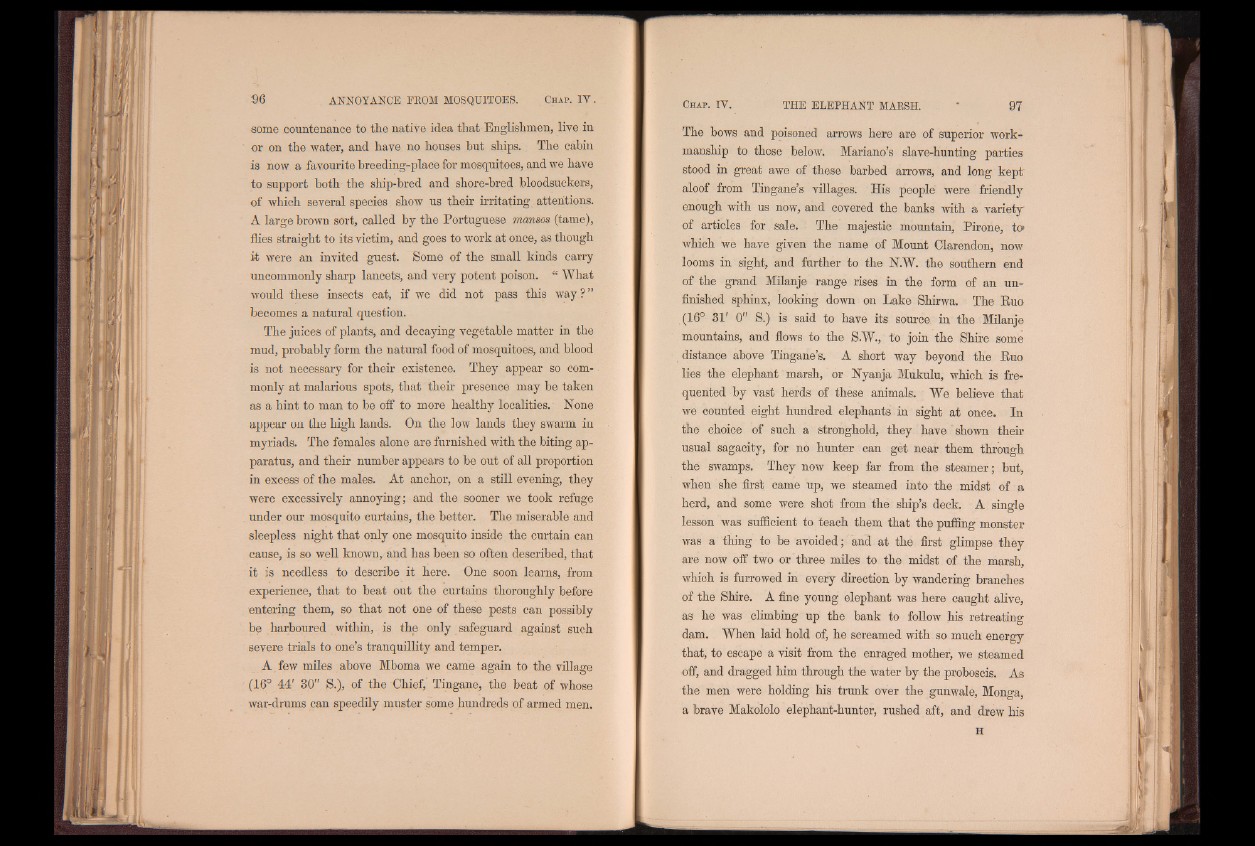
some countenance to the native idea that Englishmen, live in
or on the water, and have no houses hut ships. The cabin
is now a favourite breeding-place for mosquitoes, and we have
to support both the ship-bred and shore-bred bloodsuckers,
of which several species show us their irritating attentions.
A large brown sort, called by the Portuguese mansos (tame),
flies straight to its victim, and goes to work at once, as though
it were an invited guest. Some of the small kinds carry
uncommonly sharp lancets, and very potent poison. “ What
would these insects eat, if we did not pass this way ? ”
becomes a natural question.
The juices of plants, and decaying vegetable matter in the
mud, probably form the natural food of mosquitoes, and blood
is not necessary for their existence. They appear so commonly
at malarious spots, that their presence may be taken
as a hint to man to be off to more healthy localities. None
appear on the high lands. On the low lands they swarm in
myriads. The females alone are furnished with the biting apparatus,
and their number appears to be out of all proportion
in excess of the males. At anchor, on a still evening, they
were excessively annoying; and the sooner we took refuge
under our mosquito curtains, the better. The miserable and
sleepless night that only one mosquito inside the curtain can
cause, is so well known, and has been so often described, that
it is needless to describe it here. One soon learns, from
experience, that to heat out the curtains thoroughly before
entering them, so that not one of these pests can possibly
be harboured within, is the only safeguard against such
severe trials to one’s tranquillity and temper.
A few miles above Mboma we came again to the village
(16° 44' 30" S.), of the Chief, Tingane, the beat of whose
war-drams can speedily muster some hundreds of armed men.
The bows and poisoned arrows here are of superior workmanship
to those below. Mariano’s slave-hunting parties
stood in great awe of these barbed arrows, and long kept
aloof from Tingane’s villages. His people were friendly
enough with us now, and covered the banks with a variety"
of articles for sale. The majestic mountain, Pirone, to
which we have given the name of Mount Clarendon, now
looms in sight, and further to the N.W. the southern end
of the grand Milanje range rises in the form of an unfinished
sphinx, looking down on Lake Shirwa. The Euo
(16° 31' 0” S.) is said to have its source in the Milanje
mountains, and flows to the S.W., to join the Shire some
distance above Tingane’s. A short way beyond the Euo
lies the elephant marsh, or Nyanja Mukulu, which is frequented
by vast herds of these animals. We believe that
we counted eight hundred elephants in sight at once. In
the choice of such a stronghold, they have shown their
usual sagacity, for no hunter can get near them through
the swamps. They now keep far from the steamer; but,
when she first came up, we steamed into the midst of a
herd, and some were, shot from the ship’s deck. A single
lesson was sufficient to teach them that the puffing monster
was a thing to be avoided; and at the first glimpse they
are now off two or three miles to the midst of the marsh,
which is furrowed in every direction by wandering branches
of the Shire. A fine young elephant was here caught alive,
as he was climbing up the bank to follow his retreating
dam. When laid hold of, he screamed with so much energy
that, to escape a visit from the enraged mother, we steamed
off, and dragged him through the water by the proboscis. As
the men were holding his trunk over the gunwale, Monga,
a brave Makololo elephant-hunter, rushed aft, and drew his